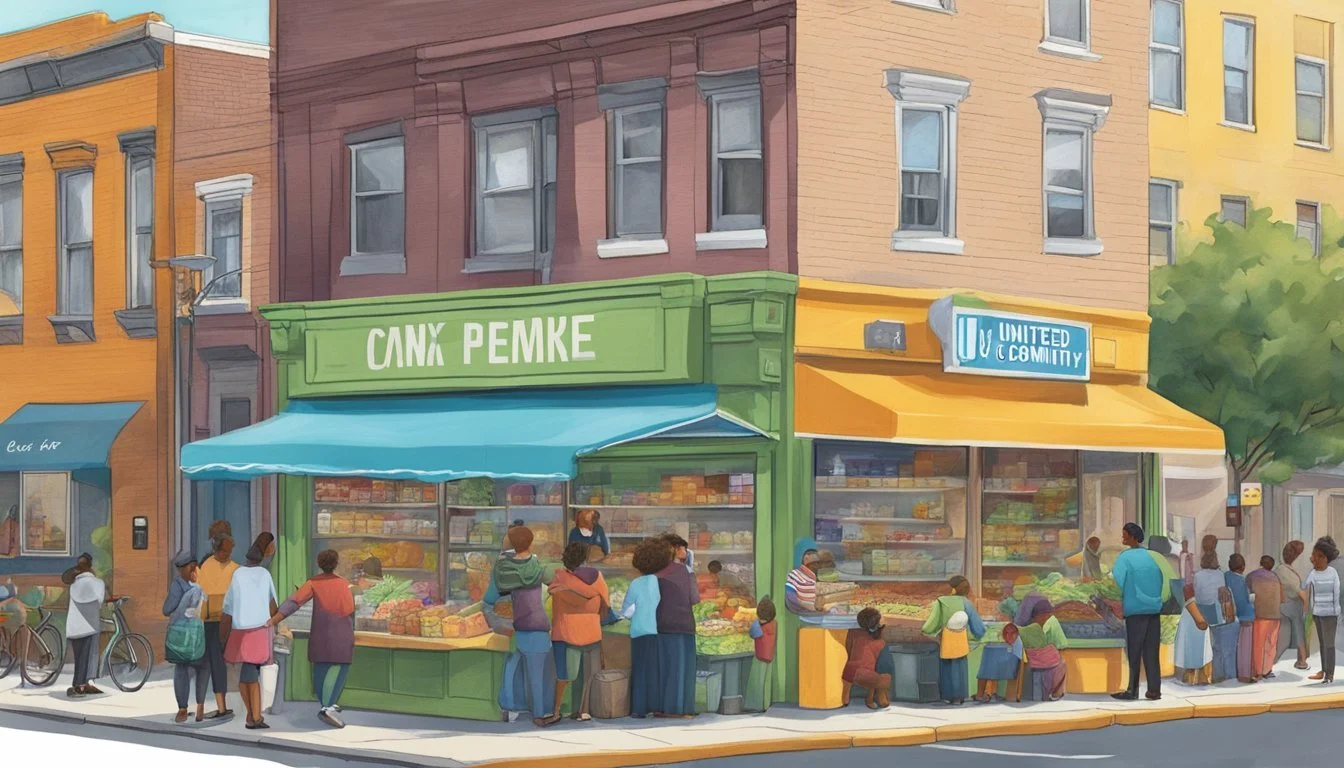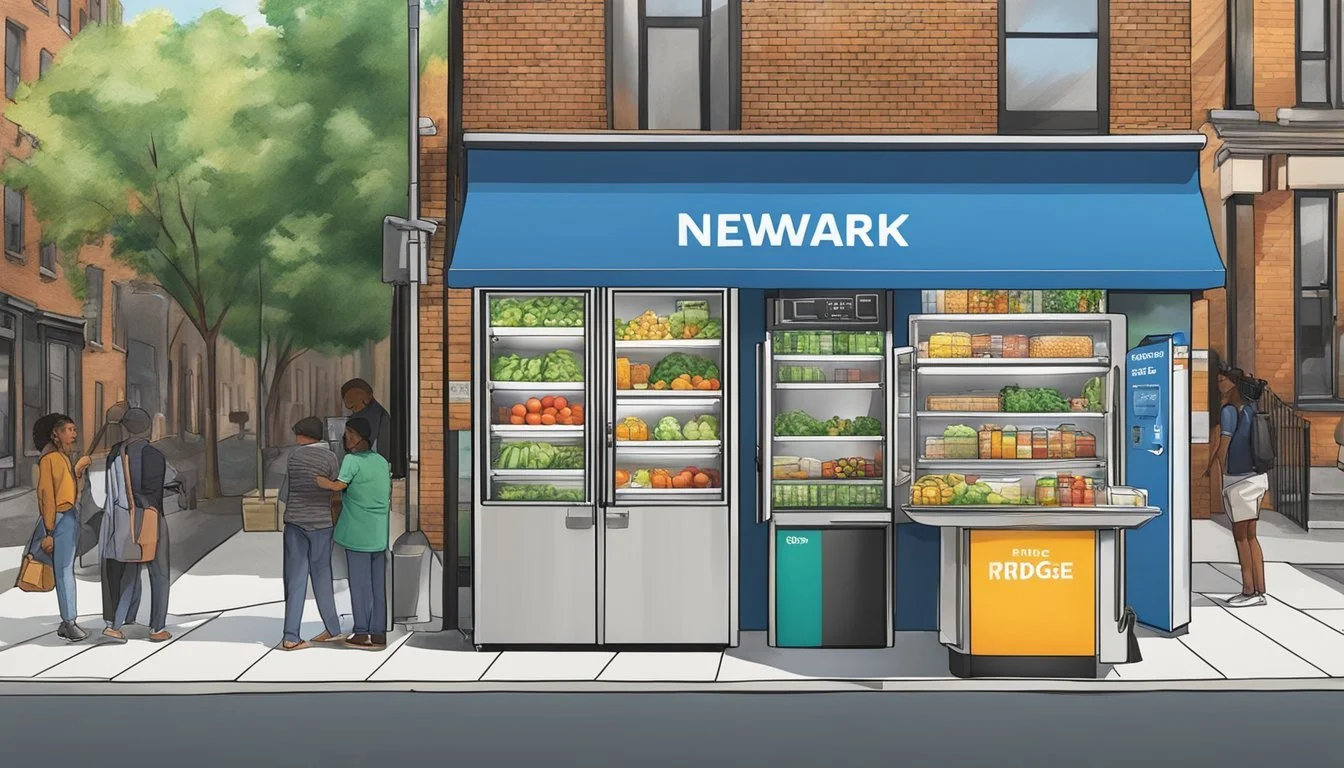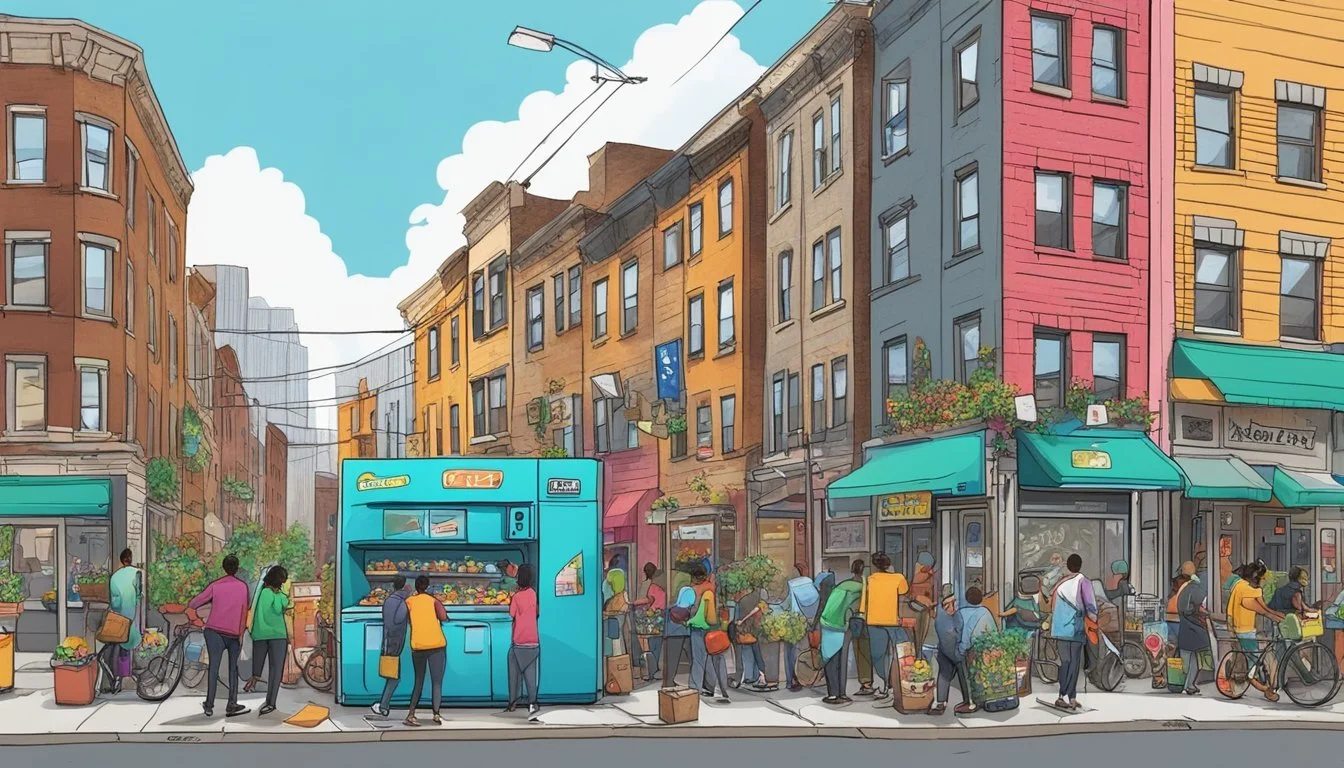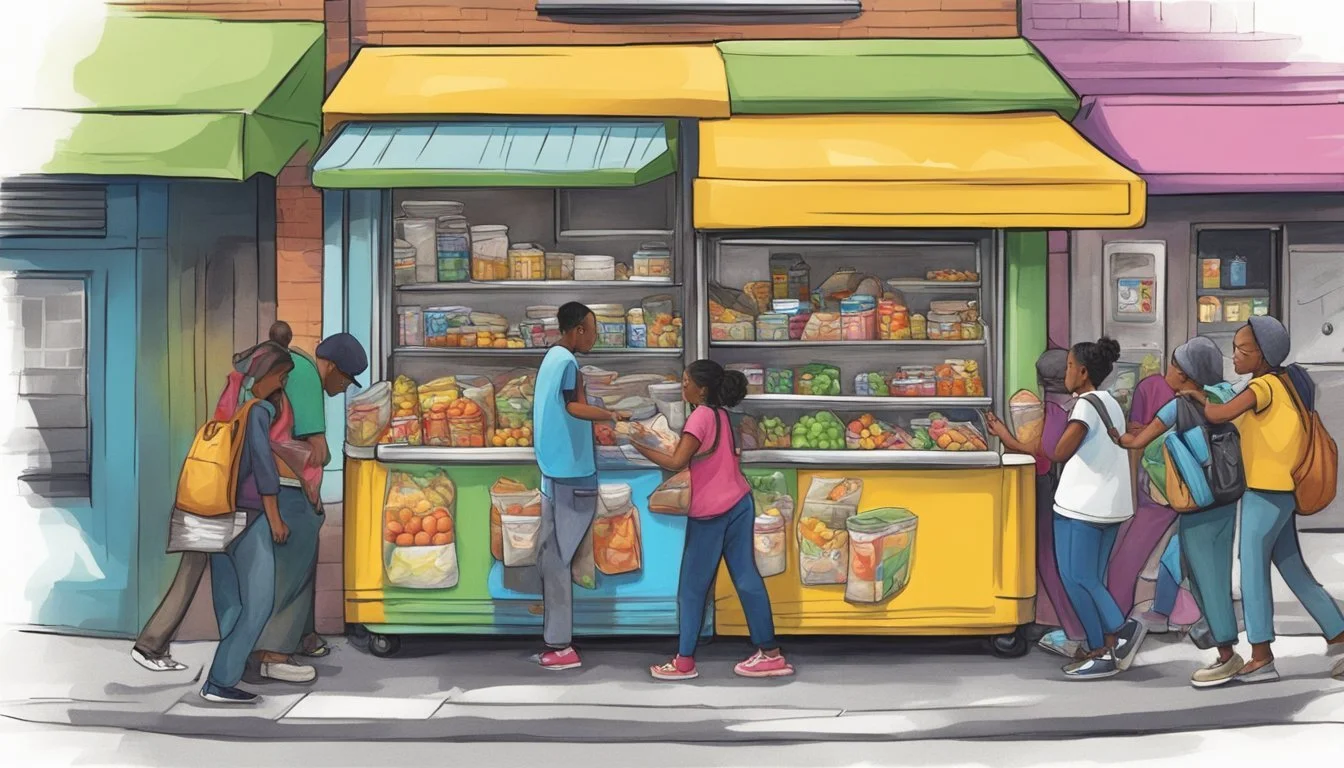Newark, NJ Community Fridge
Addressing Food Security One Meal at a Time
In Newark, New Jersey, an initiative to tackle food insecurity has taken shape through the deployment of community fridges. United Community Corporation, along with various community groups including La Casa de Don Pedro, has played an instrumental role in championing these fridges as a means to provide free and accessible food to those in need. These refrigerators, filled with essentials such as bread, cereals, and more, operate on a self-service model that allows residents to take what they need 24/7, ensuring that support is not limited by time or day.
The community fridge in Newark is more than a stopgap for hunger; it represents a collective effort to sustain community members in times of need and foster a spirit of sharing and cooperation. Strategically placed at accessible locations like in front of La Casa de Don Pedro on Broadway, these fridges are part of a larger movement to directly address the challenges many face with food scarcity. Grounded in the belief that access to food is a right rather than a privilege, these community fridges serve as a beacon of community support and resilience.
This innovative concept has garnered attention for its simple yet effective approach to alleviating some of the pressures felt by the most vulnerable populations in Newark. As the network of community fridges continues to grow, it brings light to the issues of food insecurity and serves as a testament to the city's resolve in ensuring that all residents have access to the fundamental necessities of life.
Background of Newark Community Fridges
In Newark, NJ, an initiative has taken root aiming to address food insecurity and ease the burden of food deserts—areas with limited access to affordable and nutritious food. Community Fridges have emerged as a beacon of hope in this urban landscape. They operate on a simple but powerful premise: access to free food for anyone in need, while fostering a sense of communal responsibility and support.
This grassroots effort is particularly significant in Newark where, according to local outreach organizations, food access challenges are part of daily life for many residents. United Community Corporation (UCC), alongside other community partners, has been at the forefront of this movement. Their mission aligns with that of the broader community refrigerator movement—to provide fresh food and groceries readily available to underserved communities.
As part of their initiative:
Multiple fridges have been installed across the city, including the East Ward and West Ward.
Fridge locations include 106 Ann St. and 332 14th Ave., fostering easy access within neighborhoods.
The fridges are stocked with essentials such as bread and cereals, and aim to provide a reliable source of nutrition.
The significance of the project is evident, not just in the nutritional value it provides, but also in how it empowers the community. In diverse, densely populated areas like Newark, these fridges represent more than just food; they illustrate a collective effort to confront food insecurity head-on, with dignity and solidarity.
United Community Corporation's Role
The United Community Corporation (UCC) has taken a significant stance in combating food insecurity in Newark, NJ, by launching community fridges accessible to everyone in need. Their initiatives under the guidance of UCC's Executive Director, Craig Mainor, have not only provided immediate resources but have also demonstrated the power of community collaboration.
Leadership and Vision
Under the leadership of Executive Director Craig Mainor, the UCC has become a beacon of hope and support for vulnerable communities in Newark. Mainor's vision to tackle food scarcity head-on has brought about initiatives such as the free community refrigerators. These refrigerators are a testament to UCC's commitment to policies that foster education about food accessibility and healthy eating.
Partnerships and Collaboration
The efficacy of UCC's community fridge program is amplified by strategic partnerships and collaboration. Teaming up with organizations such as La Casa de Don Pedro, the Presbytery of Northeast New Jersey, New Jersey Children’s Foundation, and the Newark Opportunity Youth Network, UCC has successfully rolled out multiple community fridges. These relationships not only extend UCC's reach into the community but also reinforce a network of support spearheaded by the corporation's initiative. Furthermore, UCC's collaboration with Partners in Health showcases the intersection of nutrition and overall wellbeing, emphasizing the full scope of the initiative's impact.
Location and Accessibility
Community fridges in Newark, NJ, are strategically placed to ensure residents in various wards have access to free, fresh food. These refrigerators are set in easily reachable locations for community members.
Ward-Based Distribution
Community fridges are distributed across Newark's wards to maximize accessibility. In the East Ward, one can find a fridge at 106 Ann St., serving locals with fresh produce and staples. Similarly, the West Ward hosts a refrigerator at 332 South 8th Street, expanding the reach of this essential service. The South Ward is not left out, with a facility located at 84 Clinton Place, introduced to support the community's needs.
Local Facilities and Schools
Supporting the community further, Newark has effectively placed community refrigerators near local facilities and schools, recognizing the necessity of this resource for families and students. A notable installation is placed at Avon Avenue Elementary School, bolstering the support network for nutrition among the youthful demographic. Acts of care are extended at the Fulton Street Emergency Shelter, where a fridge grants the most vulnerable residents, including those without homes, access to wholesome food.
These efforts, taken together, highlight Newark's commitment to combating food insecurity through careful consideration of location and accessibility.
Poverty and Food Access
In Newark, New Jersey, the interplay between poverty rates and access to nutritious food has been critically highlighted in recent times by the impact of the pandemic and innovative community responses aimed at supporting families in need.
Impact of Pandemic on Food Security
The onset of the pandemic exacerbated the pre-existing food insecurity issues in Newark. Unemployment rose, affecting household incomes, and subsequently limiting access to fresh fruits and vegetables. As a highly urban area, Newark faces the challenge of food deserts where healthy options are scarce or unaffordable.
Addressing the Needs of Families
Community initiatives have stepped in to alleviate food scarcity. Self-serve, 24/7 community refrigerators have become a direct line of support for families in need. These fridges are stocked with essential items including bread and cereals. Funding from local organizations, like the charitable arm of the New Jersey Devils, has bolstered these efforts, ensuring that these resources are continually available. In addition, food subsidies play a vital role in making this model sustainable.
Operational Aspects of Community Fridges
Community fridges in Newark are operated with a focus on consistent maintenance and the collaborative effort of various donation sources and partners. These key elements ensure the fridges are both functional and well-stocked to serve the community effectively.
Maintenance and Management
The upkeep of community refrigerators is a joint effort involving local nonprofits and community organizations. These groups ensure that the refrigerators are clean, running efficiently, and are safe for food storage. Regular checks are conducted to confirm that the temperatures are within the safe zone for food preservation. If an issue arises with a refrigerator, immediate action is taken to either repair or replace the unit to prevent disruption in service.
Donation Sources and Partners
Donations to Newark's community fridges come from diverse sources, including local supermarkets like ShopRite, specialty grocery services such as HelloFresh, and Trader Joe’s. Collaborations with organizations like MEND Hunger Relief and Devils Youth Foundation further augment the supply of nutritious options. Large corporations, including Amazon and delivery services like Instacart, also play a role in supporting these essential community resources. Donors contribute a range of foods from fresh produce to nonperishable items, facilitating a balanced diet for those in need.
Community Engagement and Education
In Newark, community fridges serve as beacons of community engagement and education, providing not only food but also involving local residents in volunteer and outreach efforts. These initiatives offer hands-on opportunities to address food insecurity and promote community solidarity.
Volunteer Opportunities
La Casa de Don Pedro and Leaders for Life are among the local organizations that offer volunteer opportunities with Newark's community fridges. Volunteers can contribute in various ways:
Food Sorting and Distribution: Volunteers help organize and distribute food directly from the community fridges.
Maintenance: Regular cleaning and maintenance of the fridges ensure they are welcoming and safe for community use.
Engaging with these efforts, volunteers gain a deeper understanding of local needs and the positive impact of their contributions.
Outreach Programs
Outreach programs are crucial in raising awareness about the community fridge resources and the Community FoodBank of New Jersey. These programs include:
Educational Workshops: They inform residents about nutrition and how to access and contribute to community fridges.
Coordination with Local News: Efforts are made to feature stories about the fridges to attract more volunteers and donors.
Through strategic community engagement, Newark's community fridge initiative continues to educate and mobilize residents, making a tangible difference in the fight against hunger.
Supporting the Movement
The Community Fridge movement in Newark, NJ draws on broad support to ensure that food insecurity is addressed effectively. Through donations of food, financial contributions, and awareness campaigns, the initiative continues to thrive and expand its reach within the community.
How to Donate Food
Individuals and businesses can contribute by donating non-perishable food items directly to the community refrigerators. These items should be unopened and within their expiration date to ensure safety and quality for those they serve. Perishable items like fresh produce and bread can also be donated as long as they are in good condition. Businesses like Trader Joe’s and local food pantries have been instrumental in providing a consistent supply.
Financial Support and Grants
Monetary donations and grants fuel the operational aspects of the movement, covering essentials such as maintenance of the fridges and procurement of supplies. Financial support also comes from community members who wish to contribute funds, with some residents donating as they are able. Grants and support from organizations like HelloFresh and the Community Foodbank of New Jersey bolster the initiative's capacity to serve many families.
Advocacy and Awareness Initiatives
Raising awareness is a key strategy for sustaining the community fridge project. Advocates like Alena Minatee promote the policy aspects of the movement, working to garner local and broader support. They focus on publicizing the initiative's impact to encourage more community involvement, ensuring the longevity of the program and its benefits to those who rely on it for their daily needs.
Future Perspectives
The Newark Community Fridge program is posited to grow, fostering greater societal cohesion and providing more residents with vital resources for food security.
Program Expansion
The trajectory of the Community Fridge initiative suggests an uptick in the number of refrigerators city-wide. Key drivers for this expansion include partnerships with local organizations and the mobilization of resources such as food delivery trucks. The program is anticipated to extend beyond current locations, potentially leveraging playoffs and other large community events to increase awareness and support.
Community Empowerment
Community fridges have become more than just a food source; they are catalysts for empowerment. As the program progresses, it is expected to enhance community engagement and encourage residents to take ownership of the initiative. Through active participation, including food donations and maintenance of the facilities, Newark citizens can foster a resilient support system.
Student Involvement
Involvement from local university students is deemed crucial for the sustainability of the Community Fridge program. These students offer a unique set of skills and enthusiasm that can be channeled into organizing food drives, managing food distribution, and educational outreach. Engagement with the academic community can also result in innovative solutions to logistical challenges, ensuring the effective allocation of resources.









